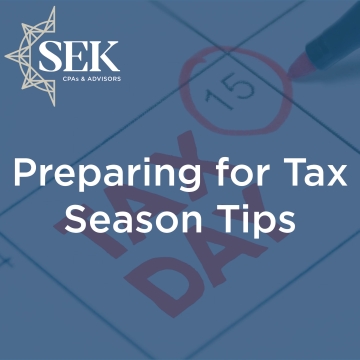Recent News & Blog / Preparing for tax season tips

December 23, 2019
Gather personal information and last year's information
Over the next few weeks, you’ll be receiving many documents related to your taxes. Make sure to designate a place to store all those W-2s, 1099s, investment statements, etc. as they arrive. Place these items in the designated location as soon as you receive them so that you can easily access them when needed. Here is a list of some documents you will be receiving: Form W-2 (for wages/salary, federal and state tax withholdings, tips, and earned income credit), Form 1099-G (if you are unemployed and receiving benefits), Form 1099-Misc (for freelance work compensation), Form 1099-R (for annuity income, IRA, and pension), Form 1099-Div (if you have earned dividends), and Form 1099-B and 1099-S (for income from sales of property and stock).
Think about changes to your filing status
There are many things to consider when getting prepared for your taxes. A change in dependents and/or filing status are certainly items to consider. If you’re going to include dependents (children or elderly), these are the documents/information you will need to provide: their social security numbers, their dates of birth, and childcare payment records (includes care provider’s tax ID number). Here are some additional questions to consider when deciding if you need to change your filing status: did you have a child? Did you get married or divorced? Did one of your children move out on their own? Think of how these changes will affect your taxes.
Make note of any deductions that should be accounted for
Please keep detailed records of any deductions you have for the tax year. Here are several potential deductions to look out for: records if self-employed (including credit card statements and receipts), expenses for rental homes and expenses related to investments, real estate and property tax records, charitable donations, records of medical expenses, insurance payments, childcare expenses, qualifying educational expenses, interest on student loans, classroom expenses for K-12 educators, and any contributions made towards retirement.
Contribute to your Roth or Traditional IRA
Contributions to an IRA can help you both save taxes and plan for the future. Consult with your CPA prior to making any contributions to ensure eligibility but be mindful of the contribution limits. The 2024 and 2025 contribution limit is $7,000, if you're under 50, and $8,000 if you're over 50 with a catch-up of $1,000. This is the same for both a Roth and Traditional IRA.
Be ready for an extension if necessary
Sometimes you simply cannot gather all the information required to prepare an accurate tax return on time. That is OK, as the IRS does allow for a 6-month extension. Consult with your CPA in order to get an extension, but remember, an extension is only an extension to file your tax return, not an extension to pay your taxes. All tax payments for are still due by April 15. Any unpaid tax could result in penalties and fines. Contact us or visit our related service page for more info on our tax services.
© 2020
References:
Smith, N. (2018, November 21). Everything you should be doing to prepare for tax season. Retrieved from
https://businessinsider.com
Related Article: Answering your tax season questions